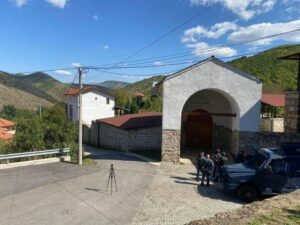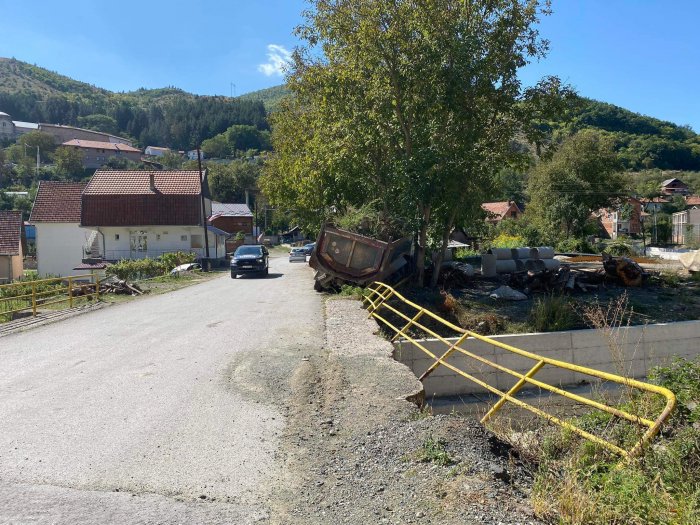The place where the Kosovo Police officer, Afrim Bunjaku, was killed
*Prepared by: Ridona Berisha
The terrorist attack in Banjska, Zvečan, was the most significant threat to Kosovo's sovereignty since its declaration of independence. During this attack, Kosovo Police officer Afrim Bunjaku was killed, and another officer was injured. This attack reintroduced the risk of an interethnic conflict, and according to Kosovo authorities, it was an attempt to forcefully alter the reality in the predominantly Serbian-populated northern region. Concerns about the escalation of the situation in the north increased after the failure to reach an agreement in Brussels between Kosovo's Prime Minister, Albin Kurti, and Serbia's President, Aleksandar Vučić, for the implementation of the Basic Agreement.
Although Serbia denied involvement in the September 24th operation, the facts presented by Kosovo institutions demonstrate hat the preparations, training, and exercises of this group were conducted at the military training base in Pasuljanske Doline and in Kopaonik. The training preparations were captured by the drones of the terrorist group which were confiscated by the Kosovo Police and which were subsequently broadcasted by the media after the ending of the operation in Banjska.
On the other hand, Serbian President Aleksandar Vučić was the first to deny that Serbia had any involvement in organizing the attack. Initially, during a press conference, he stated that local Serbs rebelled due to the oppressive policies of Kosovo's Prime Minister, Albin Kurti. Vucic justified this by saying that Serbia does not exercise effective control over Kosovo's territory, reiterating that they would never recognize Kosovo's independence. At the head of the terrorist group was Milan Radojicic, who has been in hiding for years after being indicted by Kosovo law enforcement authorities and who is also on the United Nations blacklist due to his criminal activities in the north.
The Chronology of the Attack
On the morning of September 24th, Kosovo's Prime Minister, Albin Kurti, announced that around 3 a.m. the Kosovo Police were attacked in the village of Banjska, Zvečan, resulting in the death of one Kosovo Police officer and the injury of another.
In subsequent explanations, the Kosovo Police stated that the rapid response unit of the border police noticed that at the entrance of the village of Banjska, two heavy trucks (without license plates) had been positioned, blocking access to the village. Upon receiving this information, the law enforcement units of the Zvečan Police Station responded to the incident and dispatched three units to the location. The police units encountered resistance and were fired upon from various positions, including the use of firearms, hand grenades, and explosives.
Officials from the government of Kosovo stated that the ultimate goal was the annexation of the north by inciting uprisings among the local Serbian population. In the images confiscated by the Kosovo Police from the drones of the terrorist group, which departed through mountainous routes towards Serbia, it is evident that the preparations were carried out at training centers in Serbia. The General Director of the Kosovo Police, Gazmend Hoxha, mentioned that from the ongoing investigations, it has been concluded that the terrorist group that attacked the Kosovo Police in Banjska on September 24th had trained in the facilities of Hotel Grey in Kopaonik, owned by Milan Radojičić, who took responsibility for organizing the attack.
According to other information provided by the state authorities, there were at least 30 heavily armed individuals, professionals, military personnel, and police officers, who were surrounded by Kosovo police forces. However, the number of the group's participants changed, since during the latest ministerial conference, it was stated that there were around 90 attackers from Serbia.
The investigations of the Attack
The attack on the Kosovo Police prompted various international reactions, with calls for a thorough investigation and the disclosure of all circumstances. The EU and the USA offered their support to Kosovo in investigating the incident and also called on Serbia to cooperate in this matter.
The United States Ambassador to Kosovo, Jeffrey Hovenier, stated that the attack came from a well-organized, trained, and professional group equipped with a variety of military gear, suggesting a structured background. "We want to pursue this to the end and hold the responsible parties accountable," he said. On September 26, 2023, EU member states condemned the attack on the Kosovo Police and called for the case to be clarified. Some countries also urged a balanced approach by the EU towards Kosovo and Serbia if their involvement in the attacks on the Kosovo Police is proven. Meanwhile, the UK Embassy called for Kosovo institutions to be allowed to investigate and identify the attackers, "so they can be brought to justice."
After the attack, NATO Secretary General Jens Stoltenberg authorized the deployment of additional troops in Kosovo. The United Kingdom decided to send approximately 200 soldiers from the First Battalion of the Royal Welsh Regiment, who are expected to join the British contingent of 400 troops as part of KFOR.

The Entrance of the Banjska Monastery, where the terrorist group from Serbia stayed.
Blaming the Serbs of the North
Vucic reiterated the discourse and narratives he has constructed over the years in relation to Kosovo, even after the events in Banjska. In his frequent appearances, including in international media, he stated that they have tried to draw Brussels and Washington's attention every day but that “the Serbs have not been listened to.”
In line with Vucic's stance, on September 29, 2023, the Deputy Chairman of the Serbian List, Milan Radoiçic, through his lawyer, admitted to organizing and participating in the September 24 attack. He also announced his resignation from the position of Deputy Chairman of the Serbian List. A week after the attack, Radojicic was arrested and questioned by a prosecutor in Belgrade. However, he was released after only two days, despite being at the helm of the terrorist group that killed a Kosovo Police officer. Serbia also declared September 27th a day of mourning in solidarity with the three killed in the terrorist attack. In line with Vucic's policy, the Serbian List in Kosovo also declared three days of mourning. The declaration of terrorists as heroes and their glorification is another evidence that Serbia supports actions aimed at undermining the constitutional order and sovereignty of Kosovo, a state that Serbia does not recognize.
For years, Radojicic's name has been synonymous with crime and contraband in the north, although in certain periods, he has also collaborated with Albanian politicians from Prishtina. He is suspected of being involved in the assassination of the former northern Serb politician, Oliver Ivanovic. Additionally, in December 2021, the U.S. Ministry of Finance included Milan Radojicic on its sanctions list. For many years, Radojicic has been the deputy to Zvonko Veselinovic and the leader of an organized crime group responsible for contraband in the north.
Despite Serbia's denial of involvement and despite international calls, Vučić took the opposite direction, further escalating the situation through movements he has applied whenever tensions have arisen in the north. Consequently, on September 30, 2023, reports emerged of a military convoy moving toward the border with Kosovo. The Serbian army deployed its troops very close to the border with Kosovo, raising concerns of a possible attack. On the same day, the government of Kosovo called on Serbia to withdraw its military forces from the border while also requesting an increase in KFOR presence along the border. According to the Kosovo Government, on September 29, the Serbian Army positioned its military and gendarmerie capabilities across 48 forward operational bases, extending just a few kilometers into Serbian territory along the Kosovo border. The placement of the Serbian army along the Kosovo border was also monitored by the United States, which called on Serbia to withdraw them. Speaking about the September 24 attack, White House National Security spokesperson John Kirby stated that the large quantity of weaponry found poses a threat not only to Kosovo but also to international personnel, including NATO forces.
Following the U.S. warning, Serbian President Aleksander Vucic, ordered the withdrawal of military forces, arguing that they had no intention of entering Kosovo.
Disinformation About the Attack in the North
Throughout this situation, disinformation has not been lacking, attempting to sway public opinion in both Kosovo and Serbia. In fact, the President of Serbia, Vucic, tried to involve international actors. He claimed to have asked the ambassadors of the QUINT states to find out why EULEX was denied participation by the Kosovo Police in the operation carried out in northern Kosovo. However, this was refuted by EULEX, stating that “in no way were they prevented from participating or observing the operations conducted by the Kosovo Police on September 24.”
After the publication of the video on the day of the attack, showing Milan Radojicic near the Banjska Monastery, Serbia's Foreign Minister, Ivica Daciç, initially claimed that the video was not from the day of the attack. However, he later admitted to making false statements, explaining that “someone told me it was an older video, I didn't check it, I didn't want to justify Radojičić."
After the “Banjska” incident, the battle between Kosovo and Serbia shifted to the diplomatic level. President Osmani and Prime Minister Kurti, in interviews with international media, called for Serbia to be held accountable for the attack, insisting on the imposition of sanctions. However, the EU stated that they are awaiting investigations before considering any decisions related to sanctions. Kosovo remains under these measures, which the EU had imposed following the tensions in the north. On the other hand, President Vucic also denied his country's involvement in the attack in international media, ruling out the possibility of Radojcic's extradition to Kosovo.
Numerous disinformation campaigns circulated regarding the number of casualties from the attacking group. Many Albanian-language news outlets misinformed by publishing figures that ranged from six to eight or even up to 15 members of the attacking group killed. However, these reports were refuted by official authorities, which have only confirmed the deaths of three members from the attacking group so far. Other manipulations were also carried out through photos published from other conflict zones, claiming to be the slain attackers in northern Kosovo.
Despite the departure of the attacking group, there are still concerns about the security situation in the northern part of the country. In addition to the deployment of additional troops, KFOR has increased patrols in the north. Currently, this force comprises over 4,000 troops in Kosovo from 27 NATO member states.
*This article is published as part of the Western Balkans Regional Initiative against disinformation. “Western Balkans Anti-Disinformation Hub: exposing malign influences through watchdog journalism.”





























































